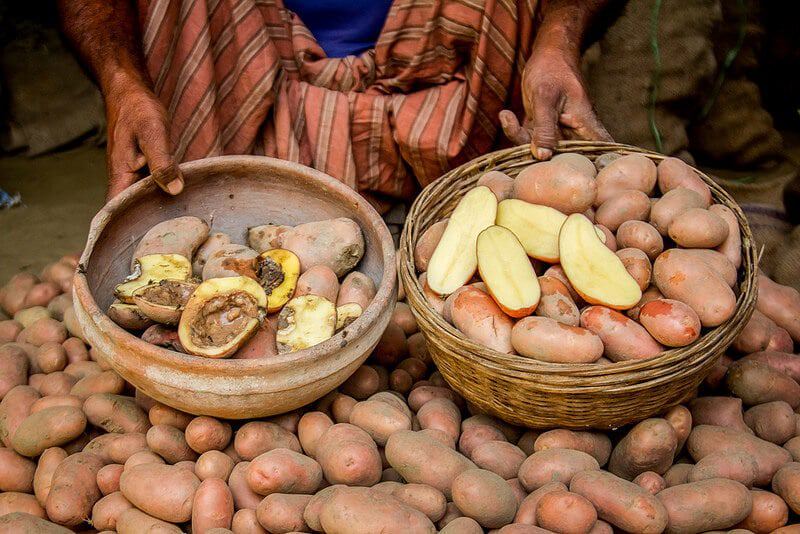Rwanda faces a ‘honey crisis’: Here’s how genetically-modified pest-resistant potatoes could help reduce pesticide use and boost bee populations
Rwanda faces a ‘honey crisis’: Here’s how genetically-modified pest-resistant potatoes could help reduce pesticide use and boost bee populations


If adopted in Rwanda, genetically modified crops such as irish potatoes that no longer require use of pesticides in treating potato late blight disease could stop the decline in bee population and help increase honey production, scientists have said.
…
According to the International potato Centre (CIP), in East Africa, the disease can destroy as much as 60-100 per cent of the crop and it costs farmers an estimated $3-10 billion per year globally.
In Rwanda, the disease erodes 80 per cent of expected produce if a farmer has no financial capacity to afford required agro-chemicals, according to farmers.
“Diseases and pests that attack crops triggered the use of pesticides which killed so many bees and thus reduced honey production from over 6,000 tonnes officially recorded, to 2,000 tonnes, per year,” said Jean Damascene Ntaganda, the head of the beekeepers’ federation in Rwanda.
Targeting East African potato growing countries like Kenya, Rwanda and Uganda, the International Potato Centre’s scientists have bioengineered four locally grown potato varieties with three resistance (3R) genes. These bioengineered potatoes can be cultivated not only in East Africa (Kenya, Rwanda, and Uganda) but also in other African countries, such as Ethiopia, and Nigeria.
…
The alarming decline of bees and pollinators in many regions can be attributed to a number of factors including improper use of pesticides and habitat loss according to [the Food and Agriculture Organization, or] FAO.
This is an excerpt. Read the original post here

 | Videos | More... |

Video: Nuclear energy will destroy us? Global warming is an existential threat? Chemicals are massacring bees? Donate to the Green Industrial Complex!
 | Bees & Pollinators | More... |

GLP podcast: Science journalism is a mess. Here’s how to fix it

Mosquito massacre: Can we safely tackle malaria with a CRISPR gene drive?

Are we facing an ‘Insect Apocalypse’ caused by ‘intensive, industrial’ farming and agricultural chemicals? The media say yes; Science says ‘no’
 | Infographics | More... |

Infographic: Global regulatory and health research agencies on whether glyphosate causes cancer
 | GMO FAQs | More... |

Why is there controversy over GMO foods but not GMO drugs?

How are GMOs labeled around the world?

How does genetic engineering differ from conventional breeding?
 | GLP Profiles | More... |

Alex Jones: Right-wing conspiracy theorist stokes fear of GMOs, pesticides to sell ‘health supplements’




 Viewpoint — Fact checking MAHA mythmakers: How wellness influencers and RFK, Jr. undermine American science and health
Viewpoint — Fact checking MAHA mythmakers: How wellness influencers and RFK, Jr. undermine American science and health Viewpoint: Video — Big Solar is gobbling up productive agricultural land and hurting farmers yet providing little energy or sustainabilty gains
Viewpoint: Video — Big Solar is gobbling up productive agricultural land and hurting farmers yet providing little energy or sustainabilty gains Fighting deforestation with CO2: Biotechnology breakthrough creates sustainable palm oil alternative for cosmetics
Fighting deforestation with CO2: Biotechnology breakthrough creates sustainable palm oil alternative for cosmetics Trust issues: What happens when therapists use ChatGPT?
Trust issues: What happens when therapists use ChatGPT? 30-year-old tomato line shows genetic resistance to devastating virus
30-year-old tomato line shows genetic resistance to devastating virus California, Washington, Oregon forge immunization alliance to safeguard vaccine access against federal undermining
California, Washington, Oregon forge immunization alliance to safeguard vaccine access against federal undermining The free-range chicken dilemma: Better for birds, but with substantial costs
The free-range chicken dilemma: Better for birds, but with substantial costs ‘You have to treat the brain first’: Rethinking chronic pain with Sanjay Gupta
‘You have to treat the brain first’: Rethinking chronic pain with Sanjay Gupta
